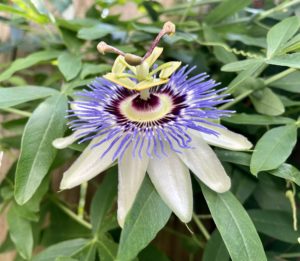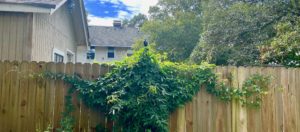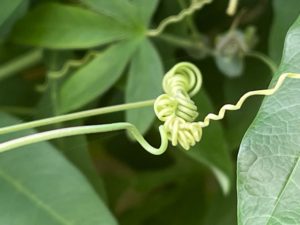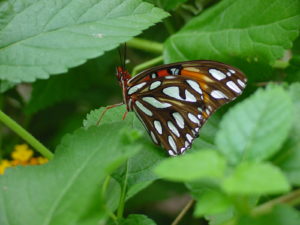
By Mary Reid Barrow
Years ago, my son came racing home on his bike to tell me I had to come quickly to see this beautiful flower growing on a telephone poll in the neighborhood.
That was a little out of character for Gibbs, who was probably 10 or 11 years old then. He cared about nature in general as a youngster, but flowers—not so much.
I went back with him to the pole which was on Bay Colony Drive and we found a passionvine in bloom.
A layer of cream and a layer of lavender flowers supported tiers of plant exotica. That’s all I know to call it. The bloom looked like a wedding cake created by a baker with a most unusual imagination.
No wonder Gibbs was blown away. To this day, I still am taken aback every single time I see a passion flower.
Passionvine is a native and you might see it alongside a road, on the dunes, or on a telephone pole, but it’s not rampant until it is. It grows like crazy in a tangle of vines and corkscrew tendrils. It spreads with suckers, but you can control the spread by cutting the suckers.
It looks great on fences, arbors and other supports, according to “Native Plants for Southeast Virginia including Hampton Roads Region.” In the fall after it blooms, the vine produces a yellow fruit that is edible. Some call the vine a Maypop, said the plant guide, because its hollow fruit makes a popping sound when it is smashed.

Passionvine was so named because monks in the 15th century saw the story of Jesus in the parts of the flower. The plant also has been said to have been used to treat anxiety and similar ailments.
Folks love passionvine not only for its own beauty, but also for the beauty of the butterflies it attracts. The passionvine is the host plant to both the variegated fritillary and the gulf fritillary.
The butterflies seem to like the helter-skelter nature of the vine’s great curly tendrils and often lay their eggs on them, rather than the stems and leaves.

The harmless, also orange-ish caterpillars are a bit Halloween-like with their black bristles and black markings. The variegated fritillary caterpillar tempers its scary costume with white spots.
They grow up dining on the vine’s leaves that must be imbued with special beauty genes, because the butterflies that emerge can vie with the passion flowers for who’s the best looking every time.
The two big orange-ish cousins with black markings on their wings are stunners. The underside of the wings of the gulf fritillary, in particular, look like stained glass windows.

When Mother Nature was handing out the butterfly host plants, I imagine she knew that critters as beautiful as the fritillaries would not have accepted a host plant any less beautiful than the passionvine!
Do you have a favorite tree or plant with a story to tell? What relationships have you observed between plants and critters? Who eats whom? Who has babies where? Send an email to maryreid@lrnow.org
CORRECTION: I’ve learned from some astute readers that my passionvine in the blog is not the native species, Passiflora incarnata, but a species from South America, Passiflora caerulea. I purchased it locally and thought it was a native. Both plants serve as host plants to the fritillary butterflies and are similar in appearance. The native has a three-lobed leaf and my imposter has a five-lobed leaf. The native flower is a little less colorful, though both are beautiful, and both are enthusiastic growers, though the South American variety is said to be more so.